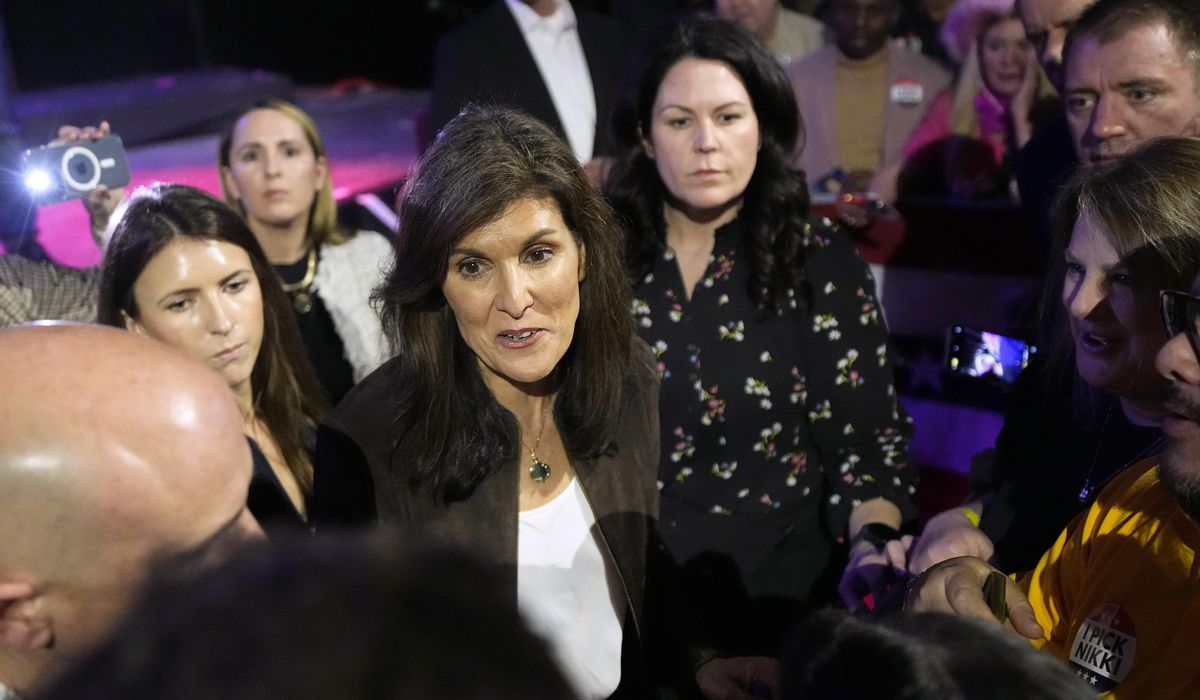


The polls are dreadful, her delegate count is underwhelming, and she’s about to lose her home-state primary, but Nikki Haley isn’t dropping her presidential bid.
Instead, she’s aggressively raising money and looking beyond Saturday’s South Carolina primary to Super Tuesday, when she’ll try to carve a winning path with independents and even Democratic voters in her quest to stop prohibitive front-runner and former President Donald Trump.
The former South Carolina governor says she’s in it to win, but political analysts say she may be clinging to her candidacy to strengthen her chances in 2028.
Mr. Trump is leading in the delegate count and has yet to lose a primary or caucus. Ms. Haley hasn’t won one and is poised for more losses in the weeks ahead. Mr. Trump is leading significantly in the polls in every upcoming primary.
“With Trump cruising towards the nomination, Haley could be showing GOP primary voters that she is a viable candidate in four years when the ballot could be wide open,” Republican political strategist Ron Bonjean said.
Ms. Haley is barnstorming like she can win in 2024.
She held a rally in Texas last week, sending a strong signal she plans to stick it out through Super Tuesday on March 5, when 874 delegates are up for grabs in the Lone Star State and 15 other states and territories.
Ms. Haley is the sole survivor out of more than a dozen second-tier candidates who competed for the nomination against Mr. Trump, even outlasting Florida Gov. Ron DeSantis, who was an early primary favorite.
But like her fallen opponents, she has been unable to close an enormous gap with the former president in polls or on the ground in primary states.
She’s not giving up.
“We defeated a dozen of the fellas. I just got one more fella I got to catch up to,” she told hundreds of supporters gathered in a ballroom at Gilley’s Dallas.
Her campaign has plenty of cash to keep going for a while. It raised $16.5 million in January alone and another $1.7 million at fundraising events that Mr. Haley attended in California in early February.
Despite large campaign rally crowds and a healthy campaign coffer, Ms. Haley faces a humbling defeat in Saturday’s primary in South Carolina, where she served as governor from 2011 until 2017.
Mr. Trump is ahead by an average of 30 points in the Palmetto State. His very comfortable lead and long list of endorsements from key state leaders haven’t stopped him from trashing Ms. Haley, who served under him as the U.S. ambassador to the U.N.
He’s awarded her the derogatory nickname “birdbrain” and questioned why her husband is not campaigning alongside her (he’s currently deployed to Africa with the South Carolina National Guard).
Ms. Haley, 51, is campaigning as an alternative to two “grumpy old men” — Mr. Trump, 77 and Mr. Biden 81 — and casts herself as representing a new generation of conservative candidates who can win the general election and govern without the “chaos” and legal entanglements that have engulfed Mr. Trump.
She embarked on a three-day bus tour of her home state over the weekend.
Ms. Haley on Friday took aim at Mr. Trump following the death of Russian opposition leader Alexei Navalny in a Russian prison, saying in a statement that the former president, who has praised the Russian leader, “continues to side with Vladimir Putin over our allies and our military service members.”
“Every time he was in the same room with him, he got weak in the knees,” Ms. Haley said at one event. “We can’t have a president that gets weak in the knees with Putin.”
On Friday, InsiderAdvantage released a survey of 800 likely voters in the South Carolina Republican primary and found Mr. Trump leading Ms. Haley, 60% to 38%.
Poll director Matt Towery said it’s unlikely Ms. Haley will cross the 40% threshold in her home state. He said her numbers could be strengthened by the efforts of her aligned political action committees who are recruiting Democrats who did not participate in their own primary to turn out and vote for Ms. Haley.
“Our survey indicates that this effort may have some impact but will be unlikely to provide any major boost for Haley,” Mr. Towery said. “She will likely lose the state where she once served as governor and the results, even if she moves into the low forty-percent range, will likely provide her little assistance or momentum in the onslaught of Super Tuesday states that will quickly follow.”
Mr. Trump has 63 delegates out of 1,215 needed to win. Ms. Haley has won only 17, and Mr. Trump’s delegate haul is likely to grow quickly and significantly.
About one-third of the Super Tuesday states award all delegates to a candidate who wins a majority of the vote, which Mr. Trump is poised to do. In several other states, a candidate who garners more than 50% of the vote is awarded every delegate.
Mr. Trump could wrap up the nomination in March if his winning streak continues, as the polls suggest it will.
Pollster Ron Faucheux said Ms. Haley faces “brutal” losses in the upcoming primaries.
Facing such long odds, Mr. Faucheux said, could mean that Ms. Haley’s continued campaign is aimed at positioning herself to replace Mr. Trump in the event he is convicted in any of the four criminal cases he is facing. Or, he said, she may simply be positioning herself for 2028, or perhaps is staying in the race to damage Mr. Trump as much as possible.
“Her running against both Biden and Trump also raises the question whether she may have a glimmer of hope that she could still run as an independent if South Carolina doesn’t work out,” he said.
• Susan Ferrechio can be reached at sferrechio@washingtontimes.com.
